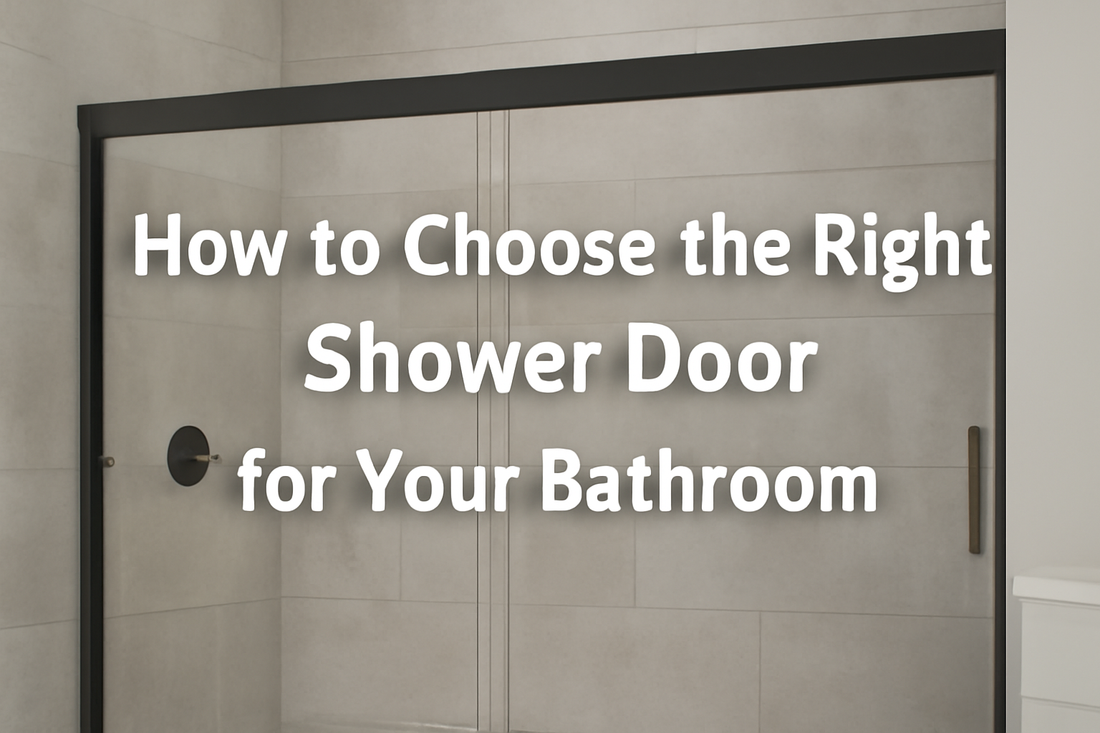
How to Choose the Right Shower Door for Your Bathroom
Share
When it comes to upgrading your bathroom, one of the most important decisions you’ll make is choosing the right shower door. With so many options available—framed, frameless, sliding, hinged—it can be overwhelming to know where to start. The shower door you choose not only impacts the overall look and feel of your bathroom but also plays a significant role in functionality and maintenance. Here's a comprehensive guide to help you select the perfect shower door for your space.
1. Consider the Size and Layout of Your Bathroom
The size and layout of your bathroom should be your first consideration when choosing a shower door. For smaller bathrooms, sliding shower doors are a great option since they don’t require extra space for a door to swing open. These doors slide smoothly on tracks, offering a clean, compact look. They are especially ideal for bathrooms with limited room.
On the other hand, if you have a larger bathroom with ample space, a hinged or pivot door might be a better fit. These doors swing open like a traditional door, providing a wider entrance. If you enjoy a more luxurious, spacious shower experience, a frameless shower door can create an open, airy feel that complements a larger bathroom.
2. Frame or Frameless: Which One Is Right for You?
The decision between a framed and frameless shower door is another key consideration. Each option has its own advantages depending on your preferences and bathroom style.
Framed Shower Doors: These doors are supported by a metal frame around the edges of the glass. They tend to be more affordable than frameless options and offer a sturdy, traditional design. Framed doors are often chosen for bathrooms that feature a more classic or vintage aesthetic.
Frameless Shower Doors: Frameless doors, like those offered by iBath, are made of thick, tempered glass and are not surrounded by a metal frame. These doors offer a sleek, modern look and are great for creating a more open and spacious feel in your bathroom. Additionally, frameless doors are easier to clean as there are fewer joints where water and soap scum can accumulate.
3. Door Type: Sliding vs. Hinged
Shower doors come in two main types: sliding and hinged.
Sliding Shower Doors: As mentioned, sliding doors are ideal for smaller bathrooms where space is limited. They consist of two or more panels that glide open and closed on a track. Sliding doors are practical and don’t require clearance space outside the shower area, which is a big plus in cramped spaces.
Hinged Shower Doors: If you have more space, a hinged door might be the way to go. These doors swing open like a regular door, providing easy access to your shower area. They work well in bathrooms with enough space to accommodate the door’s swing. Hinged doors also offer a more traditional look, and they’re often paired with more elaborate bathroom designs.
4. Glass Type and Thickness
The thickness of the glass is a critical factor to consider when choosing a shower door. Glass thickness impacts both the durability and appearance of the door. For a sleek, modern look, opt for glass that is at least 1/4-inch thick, which provides both sturdiness and a clean appearance.
If you’re considering a frameless shower door, look for glass that is 3/8-inch or 1/2-inch thick. These thicker panels provide extra stability and a premium feel. Thicker glass also adds a sense of luxury and makes the door less prone to warping or breaking over time.
5. Glass Coating: Easy to Clean and Maintain
Maintaining your shower door is essential to ensuring its longevity. Glass coatings can be a game-changer in terms of reducing water spots and soap scum build-up. Many modern shower doors, particularly frameless models, come with water-repellent coatings that help keep the glass clean with minimal effort.
With a good protective coating, water and soap scum slide off the glass more easily, reducing the amount of cleaning required. This is especially useful for homeowners who want to minimize time spent on maintenance.
6. Style and Design
Your shower door should complement the overall style of your bathroom. Frameless shower doors are perfect for a minimalist or contemporary design, while framed doors might suit a more traditional or vintage bathroom. The choice of finish—matte black, chrome, or brushed nickel—also affects the aesthetic appeal.
Consider your existing bathroom décor, the color of your tiles, and the style of your fixtures when making your selection. A well-chosen shower door not only improves your bathroom’s functionality but also enhances its visual appeal.
7. Professional Installation vs. DIY
While some homeowners may feel confident installing their shower doors, professional installation is often recommended, especially for frameless doors. Professional installers ensure that the door is properly aligned, sealed, and secure, reducing the risk of leaks and damage. If you’re installing a sliding door or a framed door, you might be able to tackle the project yourself with the right tools and instructions, but always make sure to follow the manufacturer’s guidelines carefully.
Conclusion
Choosing the right shower door is a personal decision that depends on several factors, including your bathroom size, style preferences, and budget. Whether you choose a framed or frameless door, sliding or hinged, there are options to suit every need. By considering the layout of your space, glass thickness, and ease of maintenance, you can select a shower door that fits seamlessly into your bathroom while providing lasting beauty and function.
